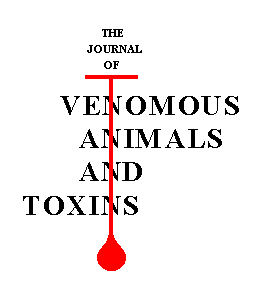THESIS: N.A. Rezende submitted this dissertation for the degree of Doctor of Philosophy publicly examined at the Department of Tropical Medicine of the Federal University of Minas Gerais, Belo Horizonte, Brazil on July 8th, 1994.
Advisor: Professor Carlos Ribeiro Diniz.
Co-advisor: Professor Carlos Faria Santos Amaral
ABSTRACT. The sensitivity and specificity of a sandwich enzyme-linked immunosorbent assay (ELISA) to detect circulating toxic venom antigens were determined in patients stung by Tityus serrulatus(1). One hundred serum samples of normal (non-stung) individuals belonging to the same socioeconomic group and living in the same areas as the stung patients were used to determine the venom assay cutoff. The mean ± SD optical density at 492 nm was 0.028 ± 0.023. Using 0.074 as the negative cutoff value (mean + 2SD), which corresponds to a venom concentration of 4.8 ng/ml , only 3 out of 100 normal sera were positive leading to a specificity of 97%. When all cases of scorpion sting were included (37 mild cases and 19 moderate or severe ones), the sensitivity of ELISA was 39.3%. When mild cases were excluded, the sensitivity increased to 94.7%. These results showed that ELISA might be used to detect circulating antigens in patients with systemic manifestations following Tityus serrulatus sting. On the other hand, ELISA might not be used for clinical studies in mild envenomation cases as the test did not distinguish mild cases from control patients. Circulating toxic venom antigens levels were cross-tabulated according to the clinical condition at hospital admission, and showed that moderate and severe cases had significant higher levels of antigens than the mild ones. Tityus serrulatus toxic venom antigens and horse anti-Tityus serrulatus venom antibodies were measured before and 1h, 6h, 12h and 24 h after serotherapy in 19 patients with systemic manifestations of envenoming (moderate and severe cases). Increased levels of venom antigens were detected in 18 out of the 19 patients before antivenom treatment, but they were no longer detected 1h after specific antivenom therapy. High antivenom titers persisted for at least 24h after antivenom adminstration. These results showed the efficacy of antivenom therapy to neutralize circulating toxic venom antigens in patients envenomed by Tityus serrulatus. These results also support prompt administration of a potent antivenom to patients with systemic manifestations of envenoming. The evolution of clinical manifestations of envenoming showed that vomiting, local pain and profuse sweating decreased 1h after serotherapy when venom antigens were no longer detected. Ethical impossibilities to compare antivenom-treated with non-treated patients did not allow an evaluation of antivenom role in the evolution of these clinical manifestations. Although all patients recovered completely, cardiorespiratory manifestations were still present in some patients after neutralization of venom antigens. Thus, patients who maintain signs and symptoms of envenoming after antivenom administration should receive adjunctive therapy and support of vital functions.
REFERENCES
01 CHAVËZ-OLORTEGUI C., FONSECA SCG., CAMPOLINA D., AMARAL CFS., DINIZ CR. ELISA for the detection of toxic antigens in experimental and clinical envenoming by Tityus serrulatus scorpion venom. Toxicon, 1994, 32, 1649-56.
 CORRESPONDENCE TO:
CORRESPONDENCE TO:
N.A. REZENDE - Departamento de Clínica Médica - Faculdade de Medicina - Universidade Federal de Minas Gerais - Avenida Alfredo Balena, 190 - CEP 30.130-100 - Belo Horizonte - Minas Gerais - Brasil.
Publication Dates
-
Publication in this collection
11 Jan 1999 -
Date of issue
1995

